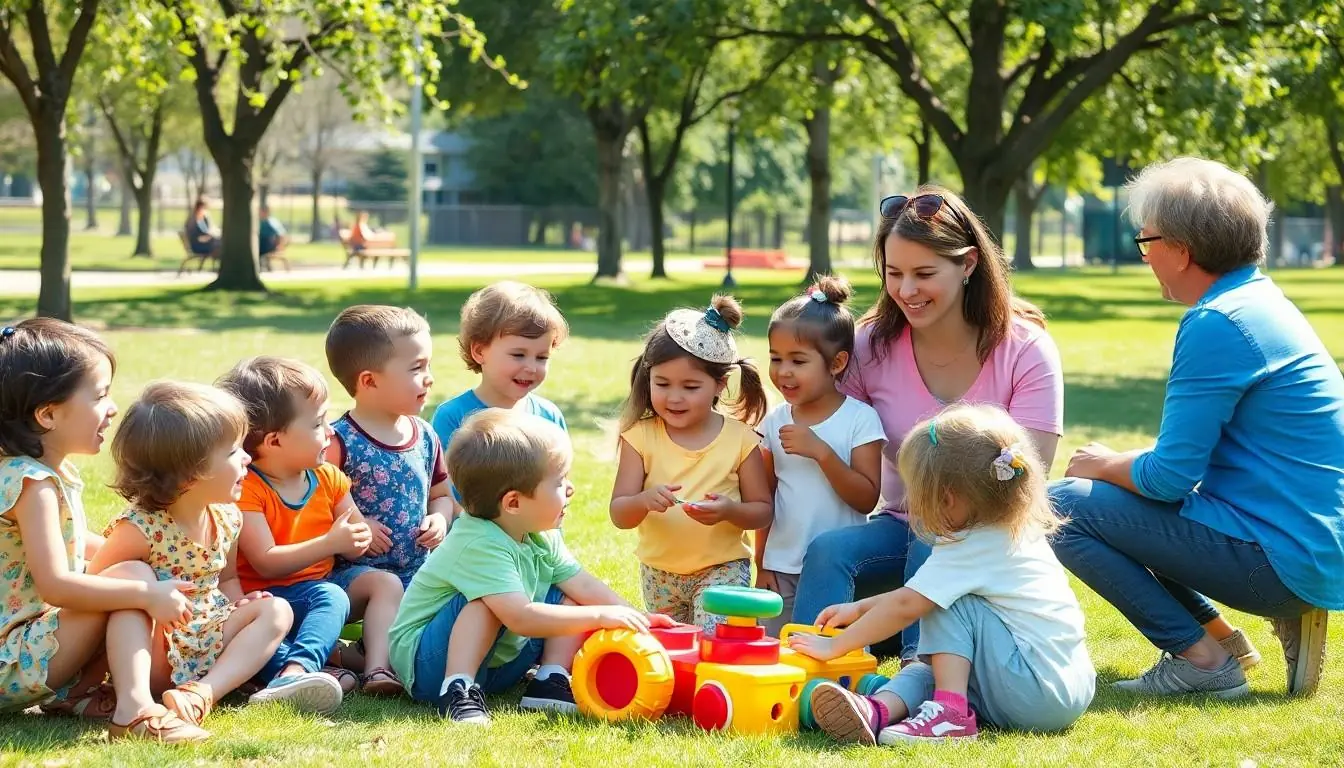Imagine a world where your living room transforms into a vibrant classroom, complete with finger paints, storytime snuggles, and the occasional snack break that feels like a gourmet feast. Homeschooling preschool isn’t just about avoiding the chaos of carpool lines; it’s about crafting a personalized learning experience that sparks joy and curiosity in little minds.
With the right approach, parents can turn everyday moments into extraordinary learning opportunities. From counting cereal pieces to exploring the wonders of nature during a backyard adventure, homeschooling offers a unique chance to bond while nurturing creativity. So, if you’re ready to trade traditional schooling for a delightful journey of discovery, buckle up! It’s time to dive into the world of homeschooling preschool, where learning is as fun as it is enriching.
Table of Contents
ToggleBenefits Of Homeschooling Preschool
Homeschooling preschool offers various advantages that cater to a child’s unique learning needs. Parents can create an enriching environment that nurtures creativity and strong relationships.
Personalized Learning Experience
Homeschooling allows for tailored educational approaches that align with a child’s interests and learning pace. Children can explore subjects in depth, leading to a deeper understanding. Parents often notice increased engagement when lessons relate to a child’s hobbies or everyday activities. Customized lesson plans can adapt as children develop, addressing strengths and weaknesses. This approach fosters independence and a love for learning early on.
Flexibility In Scheduling
Flexibility defines the homeschooling experience, enabling families to choose when and how to learn. Parents can implement lessons during peak learning times for their child, avoiding rigid school hours. Daily activities may include field trips to museums or parks, enhancing the learning experience. Unscheduled days allow for spontaneous learning opportunities that often lead to deeper connections with the material. Additionally, families can design their schedule around vacations or important events, creating a balanced lifestyle that prioritizes education alongside personal growth.
Challenges Of Homeschooling Preschool

Homeschooling preschool presents unique challenges for families. These challenges can impact both children’s development and parents’ experiences.
Socialization Opportunities
Limited socialization opportunities can pose a significant challenge. Preschool-aged children benefit from interactions with peers. Without regular exposure to other kids, children might miss out on developing social skills. Parents often seek playgroups or community classes to ensure their children engage with peers. Additionally, these interactions enhance emotional growth, making them essential for holistic development. Finding local resources that facilitate socialization may require effort but can provide invaluable experiences.
Access To Resources
Access to resources can be another hurdle for homeschooling families. Public schools often offer materials and structured programs unavailable at home. Parents might need to invest in educational materials or seek online resources. Quality educational tools are crucial to create an effective learning environment. Various websites and platforms offer learning activities, but obtaining the most suitable ones can be overwhelming. Collaborating with other homeschooling families can also help share resources and ideas, building a supportive learning community.
Essential Tips For Homeschooling Preschool
Creating a nurturing and effective homeschooling experience relies on thoughtful planning and resource selection.
Creating A Structured Environment
Establishing a consistent daily routine assists children in understanding expectations. Designating specific areas for learning can foster focus and excitement for lessons. Integrating regular breaks enhances engagement and concentration throughout the day. Encouraging hands-on activities reinforces learning while maintaining structure. Utilizing visual schedules will help children track their progress, making activities more enjoyable. Incorporating outdoor exploration into the schedule builds both learning and physical activity. Regularly revisiting and adjusting the routine based on the child’s needs supports ongoing development and adaptability.
Selecting Age-Appropriate Materials
Choosing materials geared toward preschoolers ensures alignment with their developmental stage. Look for resources that spark curiosity and cater to individual interests. Incorporating books with vibrant illustrations invites engagement and discussion. Selecting educational games designed for young learners promotes essential skills like counting and letter recognition. Exploring online platforms offers access to a vast array of interactive materials suited for preschool-aged children. Incorporating hands-on tools, like art supplies and building blocks, enhances creativity and critical thinking. Collaborating with other homeschooling families can provide insights into effective resources and useful recommendations.
Popular Homeschooling Preschool Approaches
Homeschooling preschool embraces various educational methods that cater to young children’s unique learning styles. Two well-known approaches include the Montessori Method and the Charlotte Mason Method.
Montessori Method
Montessori focuses on child-led learning. Children explore a carefully prepared environment filled with hands-on, interactive materials. This method encourages self-discovery, allowing preschoolers to choose activities that interest them. Learning experiences cover practical life skills, sensory exploration, and academic subjects. Teachers or parents act as guides, facilitating rather than directing learning. The approach fosters independence and nurtures a love for learning. According to the American Montessori Society, this method empowers young learners to develop critical thinking skills.
Charlotte Mason Method
Charlotte Mason promotes a literature-rich curriculum centered on fostering a deep connection with nature and the arts. This method emphasizes storytelling, exposure to classical literature, and participation in outdoor activities. Learning integrates subjects through real-life experiences, encouraging curiosity and imagination. Short lessons keep children engaged, allowing for a natural flow of interest. The approach advocates for developing good habits and character through consistent routines and reflections. By valuing living books, parents can cultivate a lifelong appreciation for reading in their preschoolers.
Homeschooling preschool offers a unique opportunity for families to create a nurturing and engaging learning environment. By integrating everyday activities into educational experiences children can thrive while developing essential skills. This approach not only fosters creativity but also strengthens family bonds.
While challenges like socialization and resource access exist parents can overcome them through community engagement and thoughtful planning. With the right resources and a flexible schedule homeschooling can be a rewarding journey for both children and parents. Embracing methods like Montessori or Charlotte Mason can enhance the learning experience further.
Ultimately the joy of discovery and personalized education makes homeschooling preschool a compelling choice for many families.





